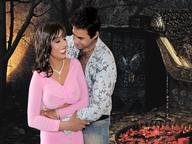Quiz Answer Key and Fun Facts
1. Garry Moore was a radio and television personality who was one of the most popular television hosts of his time. In various formats, time slots, and competition, he was a fixture from 1940s to the mid '70s. During much of his time he had a man that was his announcer, pitchman, straight man and general second banana. Do you remember his name?
2. Although Howard Stern claims to be the "King of All Media", Red Skelton was a star in traveling medicine shows, a circus clown, vaudeville, night clubs, appeared on Broadway, made 38 Hollywood films, and was one of the most popular personalities on radio and television in addition to being a recognized artist. His variety shows were often built around the characters he created. Which of these was not a Skelton character?
3. This dour looking newspaper entertainment columnist was tapped to host a network variety show in 1948 and continued until 1971. He was described by one critic as, "He got where he is not by having a personality, but by having no personality". Ed Sullivan replied to the critic simply to call her a name. None the less, "Toast of the Town" and later "The Ed Sullivan Show" was one of the highest rated 'must see' weekly staple of audiences. The program consisted of vaudeville and circus acts, singers with current hits, foreign acts, dancers, comedians and sometimes people who were just in the audience such as athletes. Ed became a starmaker and and to be invited for an appearance was regarded as a career break-through as it was for Elvis Presley, The Supremes, the Beatles, and many others. He was also vindictive toward those who crossed him. Of the following, who was not 'banned' from "Ed Sullivan"?
4. From 1948 to 1956, he was 'Mister Television' and everybody's 'uncle'. His variety program was the top program for the era, often capturing 80% of the viewing audience. It was probably the first of 'must-see' TV shows. He showed up on screen in outrageous costumes, often in drag, quipped sometimes bad jokes or puns, and kept a spirited hour going that people talked about the next day. Who was this dominant comedian from the Golden Age of television?
5. "The Colgate Comedy Hour"(1950-1955) introduced a format that held it in the top ten television rating for four of its five years. Top notch comedians would alternate each week giving each latitude to develop material with less time pressure than a weekly live commitment. Who was not tapped as a 'regular' on this variety program?
6. "Show of Shows" was innovative in that it ran 90 minutes rather than the more standard 60. It introduced Sid Caesar, Imogene Coca, Carl Reiner, and the much underrated Howard Morris as stars. Although NBC disposed of many of the kinescopes, enough survived to give the essence of the show. It later continued as the "Sid Caesar Show", reduced to sixty minutes. It was strong on satire and particularly movie parodies. In addition to the talented cast, there was an equally talented staff of writers. Who among these was not at one time a member of the writing staff?
7. From 1959 to 1968, NBC made a serious attempt to make television less of a 'wasteland' and more of a cultural medium. This variety program featured serious classical music, dancers, and singers, It had been proceeded by a popular radio series with a similar format. What was the name of this popular series?
8. CBS cancelled "The Gary Moore Show" because, they thought, it appealed to only geriatric viewers, and it wanted a program that would appeal to younger hipper viewers. CBS got more than they bargained for with "Smothers Brothers Show". Not only were the brothers young and hip, they fostered perhaps the most controversial variety program of all time. What reason did CBS give for cancelling the program?
9. "Hee Haw" ran from 1968-1971 on CBS and then went into syndication for the next twenty years, becoming one of the most successful syndicated programs ever. It featured country/western music and some of the corniest jokes ever, often using a corn field as a back drop. Popular country artists appeared on the program. Do you remember the names of the co-hosts?
10. "The Carol Burnett Show" ran from 1967 to 1978. It ranks as the most honored variety show, winning twenty-five prime time Emmys over its course. The show relied often on parodies of films and television programs and featured a troupe of versatile actors including Carol, Harvey Korman, Tim Conway and Vickie Lawrence. Who generally played the handsome leading man in many of the skits, or was the narrator?
Source: Author
Rehaberpro
This quiz was reviewed by FunTrivia editor
guitargoddess before going online.
Any errors found in FunTrivia content are routinely corrected through our feedback system.

